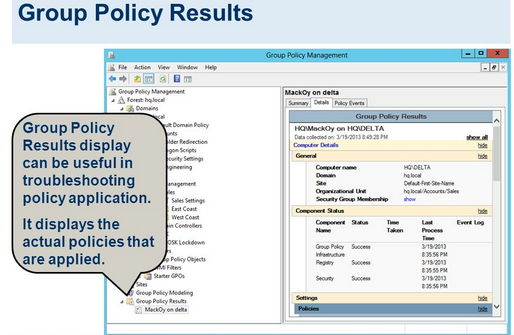Course info

This topic provides high-level information about concepts and techniques that are used to troubleshoot Group Policy settings, in addition to links to detailed reference topics, procedures, and troubleshooting scenario guides.
Understanding how to troubleshoot Group Policy is important for maintaining corporate standards. IT professionals depend on the reliability of Group Policy to keep networks secure and managed, and to lower operating costs. When an IT pro is trying to understand why a Group Policy setting did not apply to a computer or user in an expected manner, understanding where to locate and how to read and analyze information can make the difference between a small network issue and hours of downtime.
Troubleshooting Group Policy becomes complicated because Group Policy
is not just a single component or application that resides locally on a
single computer. Group Policy is a processing infrastructure that is
used to deliver and apply one or more desired configurations or policy
settings to a set of targeted users and computers within an Active
Directory environment. This processing infrastructure consists of a
Group Policy engine and multiple client-side extensions (CSEs) that are
responsible for reading specific policy settings on target client
computers. During Group Policy processing, Group Policy must access
domain-based information about Group Policy Objects (GPOs) that is
stored in Active Directory, the Group Policy container, and SYSVOL
(which provides a standard location to store the Group Policy template).
- Teacher: Thắng Lê Toàn
